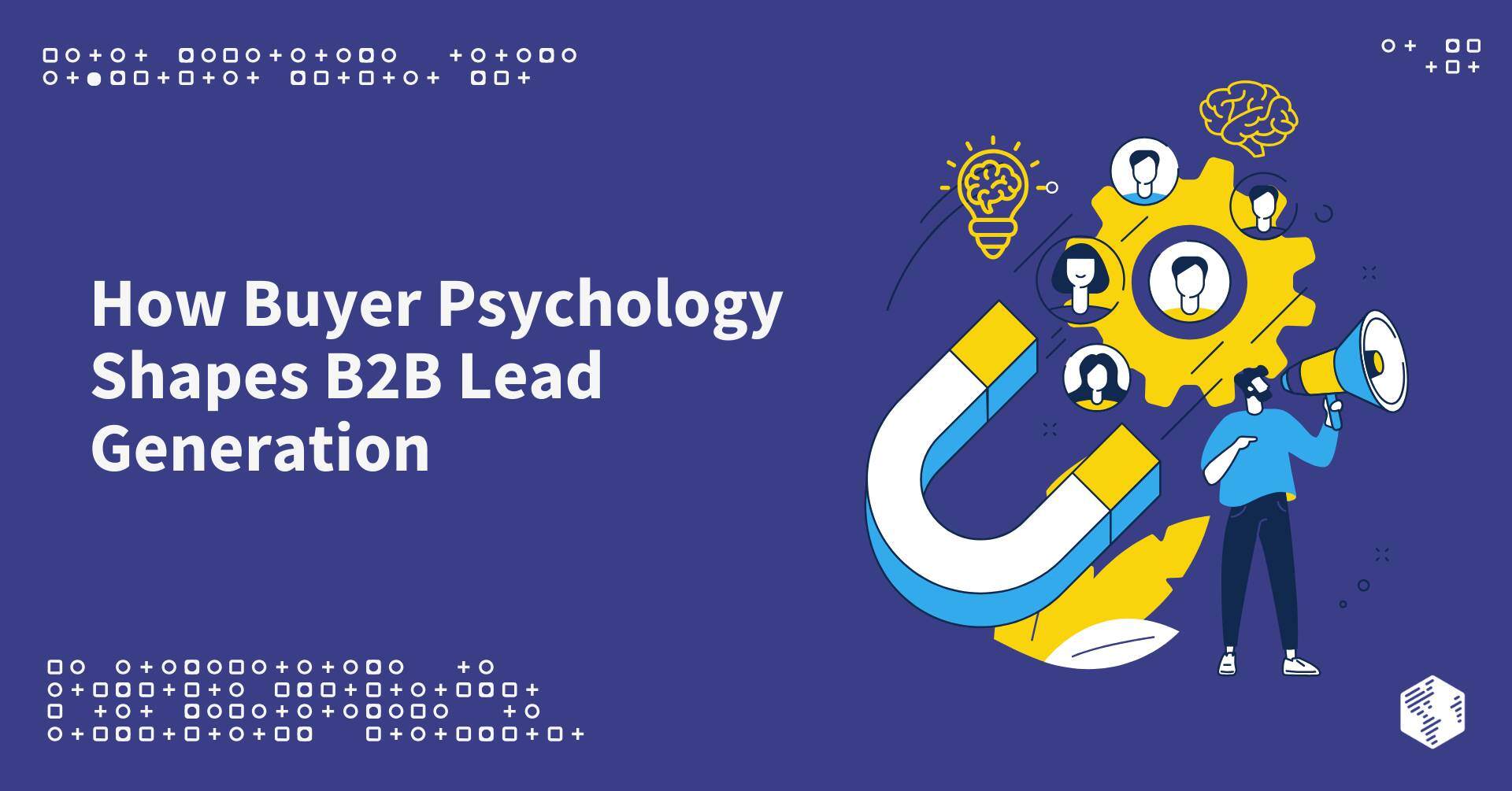Table Of Contents
One of America’s leading authorities on persuasion, charisma, negotiation, and influence, author Kurt W. Mortensen, stated, “My sales objective is to get my prospects to look at my products the same way I look at bacon.” This amusing analogy aptly highlights the philosophy of leveraging psychology to make products irresistibly appealing to potential customers. By tapping into their excitement and appetite, you position your products or services as an obvious and delightful choice.
Whether you lead a B2B business, handle marketing, or work in sales, understanding and applying sales psychology and consumer behavior principles leads to more meaningful engagements and successful conversions. Instead of just making transactions, you’ll build genuine relationships by understanding your clients’ needs, pain points, and tailoring solutions precisely for them.
The Psychology of B2B Sales and Lead Generation
Effective B2B sales tactics involve leveraging emotional triggers while maintaining honesty and a genuine desire to connect with and help your customers. Building a relationship based on authenticity and empathy is crucial for creating long-term customer loyalty and advocates for your brand. Several of these effective tactics include:
1. Emotional Triggers Influence on B2B Sales
In B2B contexts, emotions significantly influence purchasing decisions. Research indicates that B2B buyers are almost 50% more likely to purchase when they perceive personal value in a product or service, and they are willing to pay a premium for this perceived value. Emotions like trust, excitement, and fear play crucial roles; for instance, the fear of negative outcomes can drive decision-making, while excitement about innovative solutions can heighten interest and engagement.
2. Cognitive Biases
Cognitive biases are mental shortcuts our brains use to make quick decisions. Terms like “Bandwagon Effect” and “Authority Bias” aren’t just jargon. They offer practical ways to make your B2B content more persuasive. In B2B sales, understanding these types of biases is helpful for effective decision-making, marketing, and sales strategies. By understanding the psychological drivers of your audience, you can turn your content into a powerful tool for nurturing leads and building strong relationships. Types of cognitive biases include:
| Cognitive Bias | Description |
|---|---|
| Confirmation Bias | You tend to favor information that confirms your existing beliefs. For example, you might only notice data that supports your marketing strategy while ignoring data that suggests otherwise. This can lead to missed opportunities for improvement. |
| Anchoring Bias | Your first piece of information (the anchor) heavily influences your decisions. In negotiations, the initial offer sets the tone for the entire discussion. If you anchor too high or too low, it can skew the final outcome. |
| Hindsight Bias | You believe, after an event has occurred, that you predicted or knew it was going to happen. This can create overconfidence in your ability to predict future trends, leading to risky business decisions. |
| Availability Heuristic | You rely on immediate examples that come to mind when evaluating a topic. If a recent marketing campaign was successful, you might overestimate the success of similar future campaigns without considering other factors. |
3. Decision-Making Processes
The B2B buying process involves complex decision-making units with multiple stakeholders, each bringing their own biases and emotional triggers into the decision-making process. Loss aversion and status quo bias are particularly influential, where the fear of making a wrong decision can lead to decision paralysis or a preference for inaction. Understanding these dynamics is crucial for tailoring marketing strategies that resonate with all stakeholders and facilitate consensus and action.
Grasping the psychological tactics behind B2B sales, such as emotional triggers and cognitive biases, helps you craft strategies that connect with stakeholders on a deeper level. This approach not only addresses their concerns but also builds stronger, trust-based relationships, leading to more successful and lasting partnerships.
Persuasive B2B Marketing and Sales Strategies
When you understand what drives decision-makers, you can create strategies that truly connect on a more emotional and psychological level. This approach not only grabs attention but also builds trust and sparks action, helping you stand out. Let’s take a look at some practical, persuasive strategies to boost your B2B marketing and sales efforts.
1. Address Pain Points
To effectively address your customer’s needs, start by understanding their specific pain points. Whether these are financial constraints, inefficient processes, or concerns about data security, identifying these issues is crucial. Once identified, tailor your marketing messages to demonstrate how your product or service provides the perfect solution, ensuring you highlight the value and relevance it adds to your prospect’s unique challenges.
2. Personalize and Build Trust
Building trust with B2B customers starts with personalization. Customize your interactions by using the data you’ve gathered to speak directly to their needs and preferences. Show that you understand their industry and specific challenges through personalized pitches and communications. This approach makes the client feel valued and establishes a foundation of trust, which is essential for long-term business relationships.
3. Storytelling and Social Proof
Use storytelling to make your brand more relatable and memorable. Share success stories of how your solutions have effectively addressed similar challenges faced by other companies. These narratives should not only focus on the problems but also on the successful outcomes, providing social proof and illustrating the impact of your solutions. This strategy helps in forming an emotional connection with your prospects, making your messages more engaging and persuasive.
When you understand your audience’s psychological triggers you’re able to create and implement persuasive strategies into your B2B marketing and sales efforts. These insights enable you to create content and campaigns that not only capture attention but also build lasting trust and drive meaningful action.

How to Implement Psychological Principles Into Your B2B Sales and Marketing Strategy
As we’ve discussed, the decision-making process in B2B sales involves more than just logic and numbers. When you understand some of the psychological principles that drive a person to hit that checkout button, you can significantly improve your ability to connect with prospects and drive conversions. Several of these psychological strategies include:
- Limited-Time Offers and Scarcity: Limited-time offers and scarcity refer to the psychological principle that people assign more value to things that are scarce or available for a limited period. By creating a sense of urgency and potential scarcity around your offerings, you can increase their perceived value and motivate prospects to take action before the opportunity passes. For example:
- A software company offers a 50% discount for the first 100 customers who purchase their new product within the next 7 days. This creates a sense of urgency and scarcity around getting the discounted price.
- An accounting firm promotes a free consultation for businesses that sign up for their services by the end of the quarter. The limited time frame motivates potential clients to act quickly.
- An IT services provider runs a “Cyber Monday” promotion, offering deeply discounted rates on their services for a 24-hour period only. This extremely limited window makes the offer seem more valuable.
- Neuro-Linguistic Programming Techniques: NLP techniques are psychological tools that help individuals improve mental and emotional well-being by changing thoughts, language, and behavior. These techniques include visualization, reframing beliefs, goal setting, and using language patterns to communicate effectively. Use NLP techniques to:
- Form a deeper understanding of prospects: A sales team uses NLP techniques like metaphor analysis to uncover the underlying motivations and values driving a prospect’s decision-making process. This deeper insight allows them to tailor their pitch more effectively.
- Analyze communication to extract insights: A marketing team employs NLP tools to analyze prospect emails and call transcripts, identifying key phrases and linguistic patterns that reveal positive or negative sentiments, buying signals, and objections to address.
- Automate lead qualification and tailor communications: A company uses NLP algorithms to automatically score and prioritize leads based on their communication patterns and word choices. Personalized nurture campaigns are then triggered for each lead segment, using language tailored to their specific needs and preferences.
- Emotional Validation: Emotional validation recognizes that B2B purchasing decisions are heavily influenced by emotions. It involves acknowledging and addressing the emotional needs and drivers behind a prospect’s potential purchase, such as building trust, ensuring security, and appealing to pride or status. By exploring these underlying emotional factors, you can craft more effective marketing and sales approaches. For example:
- An industrial equipment manufacturer showcases how their high-precision machinery allows customers to “deliver unparalleled quality”, validating their emotional need for pride and excellence in their products.
- A B2B logistics company’s marketing highlights customer stories about how their services helped companies “respond to demand with speed and accuracy”, speaking to emotional drivers around reliability, agility, and customer satisfaction.
- In sales conversations, an enterprise resource planning (ERP) software vendor spends time understanding a prospect’s frustrations around disconnected systems, manual processes, and lack of real-time data visibility. Their proposal then validates the emotional desire for efficiency, control, and insightful decision-making their solution provides.
Applying these psychological principles can give you an edge in B2B sales and marketing. By creating urgency with scarcity, using NLP to understand prospects deeply, and addressing emotional needs, you’ll be able to connect with customers more effectively and increase conversions.
How to Measure the Success of B2B Lead Generation Efforts
To gauge the success of your B2B lead generation efforts through the lens of sales psychology, focus on Key Performance Indicators (KPIs) that reflect how well you understand and influence your prospects’ behavior. Here are some essential metrics to consider:
| Metric | Description |
|---|---|
| Conversion Rates |
|
| Customer Acquisition Cost (CAC) |
|
| Customer Lifetime Value (CLTV) |
|
| Lead Quality |
|
| Lead Response Time |
|
| Return on Investment (ROI) |
|
| Engagement Metrics |
|
| A/B Testing |
|
By regularly tracking these KPIs, you can gain valuable insights into the effectiveness of your lead-generation efforts from a psychological perspective. This allows you to make data-driven decisions, optimize your strategies, and ultimately drive better business results.
Effective B2B Lead Generation Strategies
1. Content Marketing
To optimize your B2B lead generation, focus on creating and distributing valuable content that aligns with your buyer’s needs throughout their journey. Engage with your audience through various channels and ensure your content is backed by solid research and data for credibility. Personalization is key; tailor content to individual needs to enhance the effectiveness of your marketing tactics, fostering a connection that compels potential customers to engage further.
2. Email Marketing
Effective B2B email marketing requires a strategic approach, emphasizing informational content over promotional to build trust and demonstrate value. Segment your email list to deliver tailored messages to different roles within a business, enhancing relevance and engagement. Automate your email campaigns to save time and maintain consistency, ensuring each message is targeted and timely.
3. Webinars
Webinars are a powerful tool for B2B lead generation, providing real-time engagement and the opportunity to establish brand expertise. Focus on delivering high-quality, informative content that addresses the current needs and pain points of your audience. Enhance interactivity by incorporating Q&A sessions, polls, and inviting guest speakers, which helps in building a stronger connection with the participants.
4. Social Media Engagement
Leverage social media platforms where your target audience is most active to maximize reach and engagement. Use data-driven insights to craft content that resonates with your audience, addressing their challenges and providing actionable solutions. Promote gated content through social media to gather leads, and integrate your CRM to streamline lead management and nurturing processes.

The Psychology Behind Effective B2B Lead Generation
Having insight into the psychology behind successful B2B lead generation is a valuable strategic tool to have in your arsenal. It’s all about recognizing the emotions and thoughts that drive your prospects’ decisions. By building real connections and addressing customer pain points with personalized communication, you create compelling marketing messages and foster interactions that lead to successful conversions.
Remember, the effectiveness of your strategy hinges on the depth of your client relationships and your adaptability to their evolving needs. For those looking to dive deeper and enhance their lead generation strategies further, schedule a consultation with OneIMS to explore tailored solutions for your business needs.






